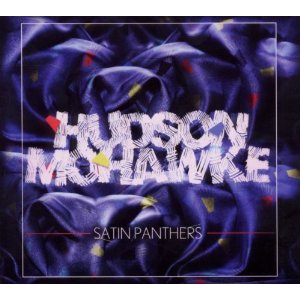Even though it’s been nearly two years since its release, it’s still difficult to know quite what to make of Hudson Mohawke’s debut album Butter. It’s almost impossible to form a coherent opinion on, largely because it crams so many different angles into its fifty-minute runtime. As soon as it’s taken on one form, it swiftly takes a U-turn and heads in the opposite direction; the resulting abrasive, treble-heavy sprawl ends up as something similar to how prog might sound, were it passed through the net-frazzled attention span of a twenty-something Glaswegian hip-hop fan. But then that’s not necessarily surprising – in an Invisible Jukebox session with The Wire not long after its release, he cited love for artists as disparate as Mahivishnu Orchestra, Timbaland, Terror Danjah and Todd Rundgren, and the album’s artwork was a technicolour vomit spray of parrots and lizards picked out in shockingly bright hues. It was probably inevitable that Butter’s contents would match its context and overall aesthetic.
In his recent book Retromania, Simon Reynolds was overly critical of the album, stating that it epitomised a modern day, "hyper-eclectic" approach to musical influences, attempting to cram too many inputs into a single output: "prog rock updated for the Pro-Tools era, a CGI-like frightmare of garish and overworked sound". Though there’s more than a grain of truth to that statement, it’s also slightly excessive in its criticism of Butter‘s constituent contents. Yes, it was very difficult to listen through from start to finish without feeling as though you’d consumed monstrous quantities of artificial sweetener. Its razor-sharp synthlines in particular felt almost carcinogenic to the ears during extended listens. But studded among Butter‘s fatty excesses (in its context, to be fair, the album’s title fit perfectly) were gems that built on Mohawke’s earlier successes. ‘Fruit Touch’ and ‘Zoom’ were both perfect extensions of his playful, hip-hop tinged Polyfolk Dance EP, and ‘Tell Me What You Want From Me’ dissolved DaM-Funk’s vocal in vats of GTA: Vice City sunset sleaze. And despite its eardrum-shattering tonality, ‘FUSE’ was a colossal beast of a track, one of the few on the album that fitted neatly alongside the drunken lurchings of his Numbers/LuckyMe friend and contemporary Rustie.
So Butter‘s follow-up Satin Panthers (again, the title’s pretty indicative of what to expect) doesn’t need to prove that Mohawke is capable of writing brilliant music – he is. In fact, the acid-fried nature of his tracks probably makes them better suited to the shorter runtime of an EP, minimizing any potential collateral damage caused by overexposure. True to form, then, opener ‘Octan’ offers aural proof that mixing every frequency together produces white noise. The sheer volume of melodic content that it contains results in its surface contours gradually flattening out into a solid, unchanging mass. Like having a bright light shone into your eyes, everything is temporarily bleached, robbed of the ability to detect anything subtler than a complete key change.
All of this might sound difficult to deal with, were it not so fiendishly addictive. Yes, Mohawke’s tracks might sometimes come across like the sonic equivalent of a sugar rush, all energy and very little substance. But like sugar, a craving to extend the high quickly sets in. The rest of Satin Panthers more than satisfies in that regard. Its huge, cocaine-pricked melodies remain present and correct throughout, but the tracks themselves are among his best so far. ‘Thunder Bay’ is a more successful versioning of what much of Butter attempted to achieve, blending Dilla’s rough and ready unquantised rhythms with grime’s overbearing physicality, while remaining subtle enough to warrant repeated listens.
Satin Panthers‘ two best tracks lie at its centre. ‘All Your Love’ is the first time Mohawke’s approach to his influences – one of synthesis, chucking everything in a vial and hoping the chemistry won’t blow up the lab entirely – feels completely at ease with itself. Yes, it’s messy as hell, sending pitched-up R’n’B vocals skating across booming drum rolls and a wash of melodic fuzz. But unlike much of his earlier material, it never overwhelms. And ‘Cbat’ takes an entirely different and joyfully straightforward approach: with its squashed, serpentine motif, staggered hi-hats and discrete bulbs of bass, it’s a faithful take on a dirty south hip-hop instrumental. Both tracks offer tantalising glimpses of future Mohawke incarnations – while Satin Panthers isn’t quite ‘what Butter could have been’, it certainly points towards what his next album could potentially achieve.


